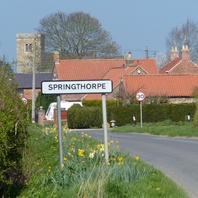
Viking Names
Springthorpe
Springthorpe, in the Corringham Wapentake of Lincolnshire, is an Anglo-Scandinavian compound from Old English spring ‘a spring, a well, the source of a stream’ and Old Norse þorp ‘a secondary settlement, a dependent outlying farmstead or hamlet’.
Read More
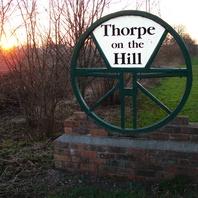
Viking Names
Thorpe on the Hill
Thorpe on the Hill, in the Graffoe Wapentake of Lincolnshire, is a simplex place-name coming from Old Norse þorp ‘a secondary settlement, a dependent outlying farmstead or hamlet’. The affix is self-explanatory.
Read More
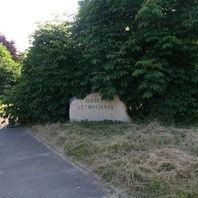
Viking Names
Driby
Driby, in the East Lindsey district of Lincolnshire, is an Anglo-Scandinavian hybrid name from Old English dryge ‘dry, dried up’ and Old Norse bý ‘a farmstead, village’.
Read More
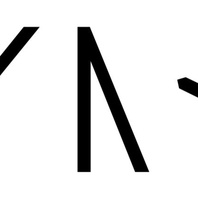
Viking Names
Asmund
Ásmundr is a very common name in Scandinavia throughout the Viking Age and later. It is recorded in medieval documents from both Lincolnshire and Yorkshire, in field-names in Lincolnshire, and in major names in North and West Yorkshire such as Osmotherley and Osmondthorpe. It is an Old Norse compound name. Its first element Ás- ‘a god’, frequent in Viking Age names, presumably refers to Old Norse deities such as Odin and Thor, though the latter name appears in its own right in many names, both male and female, while Odin is a very rare element in personal names. The second element-mundr is either Old West Norse ‘protector’ or Old Norse-Icelandic ‘gift’.
Read More
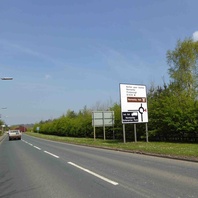
Viking Names
Flixborough
Flixborough, in the West Riding of Lindsey in Lincolnshire, is a hybrid name from the Old Norse male name Flík and Old English burh ‘a fortified place’. It is highly likely, in a place-name with Old English burh as the second element, that the Old Norse Flík has replaced an earlier Old English name or element. An important Anglo-Saxon settlement site has been excavated here.
Read More
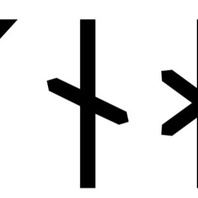
Viking Names
Hrafnhild
Hrafnhildr is recorded in a few instances in West Scandinavia (Norway and Iceland) and in the quasi-historical Icelandic text, Landnámabók ‘The Book of Settlements’ which recounts the settlement of Iceland. It is also attested in two field names in West Yorkshire. The personal name is an Old Norse compound, formed from Hrafn- , ‘raven’, combined with -hildr, ‘battle’.
Read More

Viking Names
Butti
Butti was a rare name in Scandinavia but is attested as an element in Norwegian place-names. It is also believed to be the first element of the place-name Budby, Nottinghamshire.
Read More

Viking Names
Bild
The Old Norse male personal name Bíldr is originally a byname meaning ‘blade’. It is the personal name of a fictional character in West Scandinavia and is frequently used as a byname there. A Bildus is mentioned in Saxo and the name appears as a byname in Denmark and may be found in some Danish place-names. Bildr is the first element of the place-name of Bilsthorpe, Nottinghamshire.
Read More
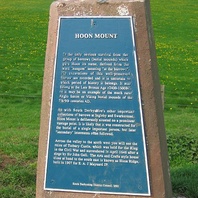
Viking Names
Hoon
Hoon, in the Appletree Hundred of Derbyshire, is a simplex place-name from haugum, the dative plural form of Old Norse haugr ‘a natural height, a hill, a heap, an artificial mound, a burial mound’, which gives the sense ‘at the barrows’. One of these barrows is now called Hoon Mount.
Read More

Viking Names
Keythorpe
Keythorpe, in the Gartree Hundred of Leicestershire, is an Anglo-Scandinavian hybrid from the Old English male personal name Keyia or Keia and Old Norse þorp ‘a secondary settlement, a dependent outlying farmstead or hamlet’. It was a daughter settlement of Tugby, which it is now a joint parish with. Alternatively, the first element could be the Old English male personal name Cœga, but this seems to be too early of a name to pair with þorp. The Old English element cœg ‘a stone’ has also been suggested; however, the drift ecology does not reflect this postulation.
Read More
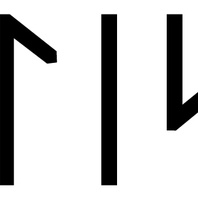
Viking Names
Blesi
The male name Blesi is found in two Swedish runic inscriptions and is also recorded as the name of one of the original settlers of Iceland. It was originally a by-name, meaning ‘blaze, white spot on a horse’s forehead’. Blesi is also the first element in the place-name Bleasby, Nottinghamshire.
